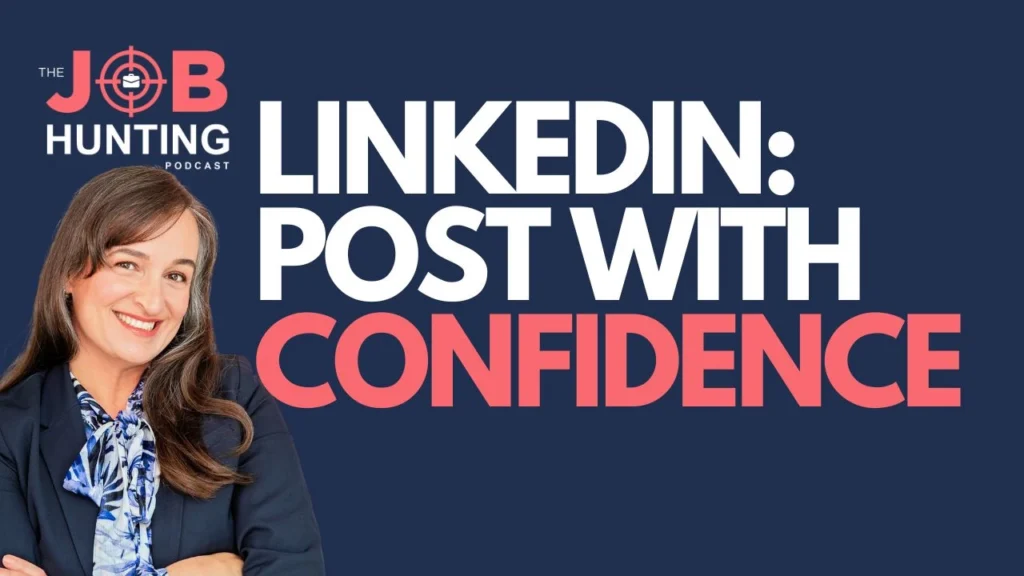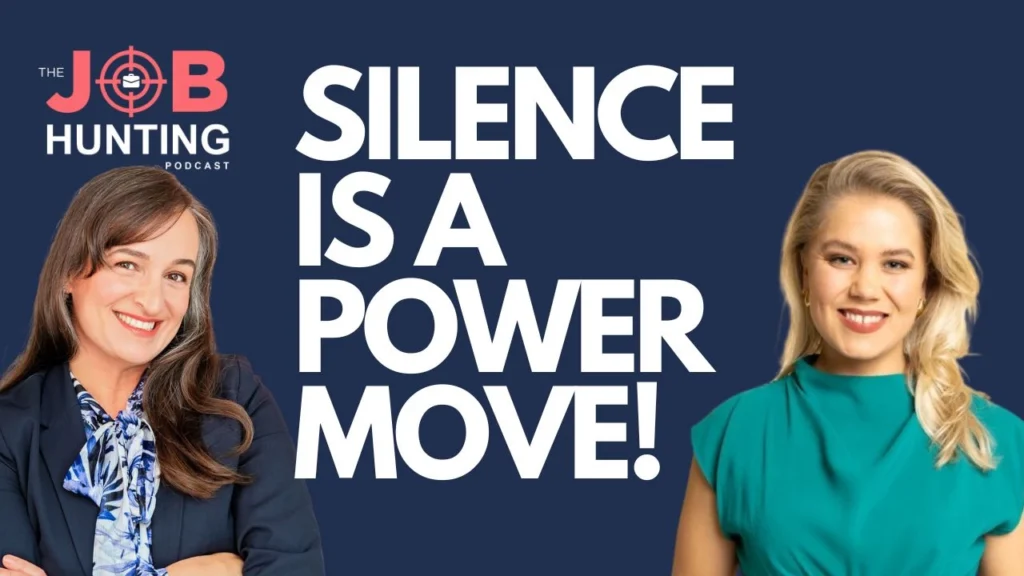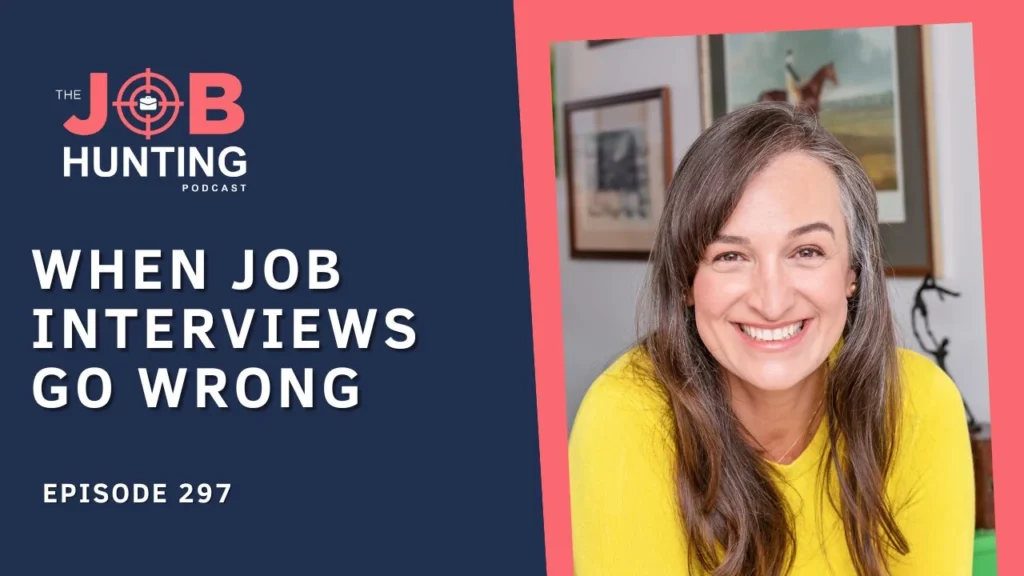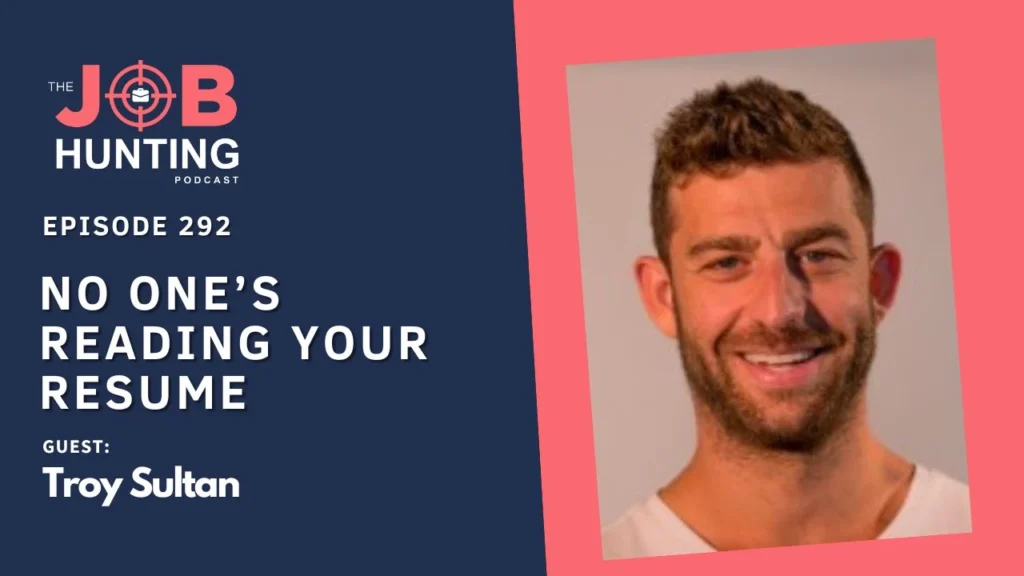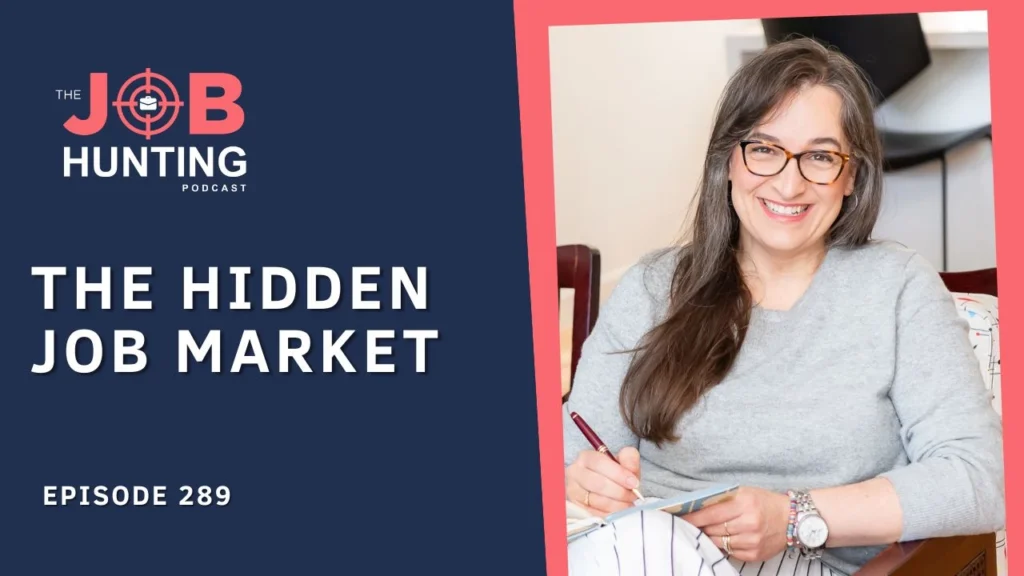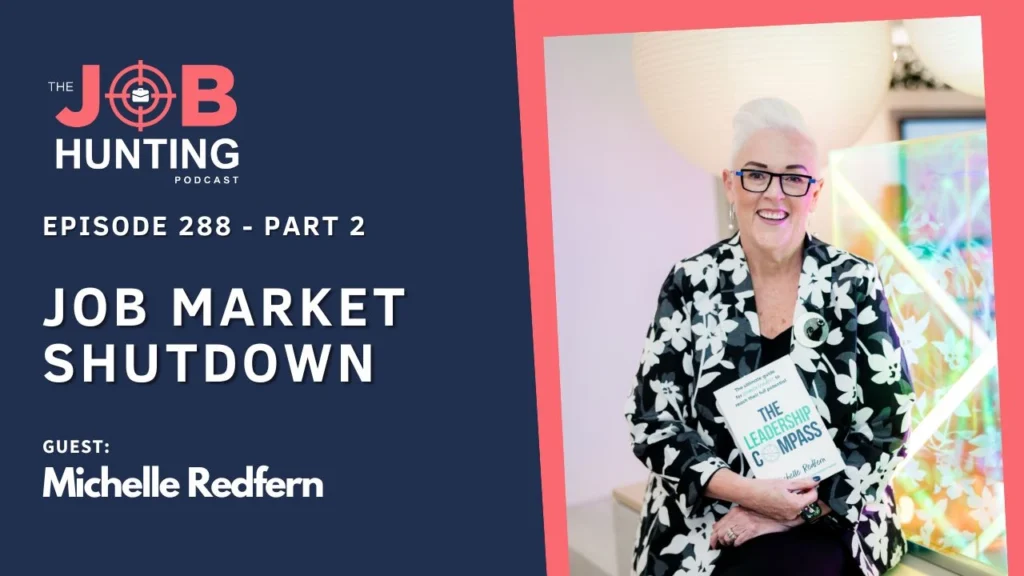Q&A on Video Resume
Episode 124 - Interview Technology and Video Resumes: Q&A with Senior Executives
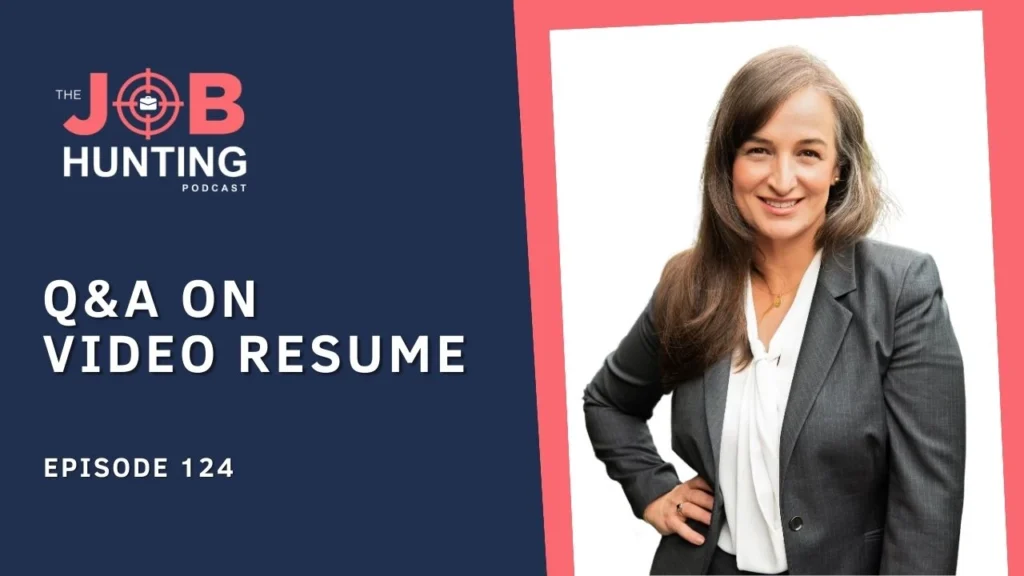
This week on the Job Hunting Podcast, we're discussing Interview technology, video resumes, ageism, hybrid work, and digital backgrounds. These topics came up in a recent zoom workshop I hosted, and I wanted to break them down for you.

About the Host, Renata Bernarde
Hello, I’m Renata Bernarde, the Host of The Job Hunting Podcast. I’m also an executive coach, job hunting expert, and career strategist. I teach professionals (corporate, non-profit, and public) the steps and frameworks to help them find great jobs, change, and advance their careers with confidence and less stress.
If you are an ambitious professional who is keen to develop a robust career plan, if you are looking to find your next job or promotion, or if you want to keep a finger on the pulse of the job market so that when you are ready, and an opportunity arises, you can hit the ground running, then this podcast is for you.
Timestamps to Guide Your Listening
-
[00:49] Thank you for your response to episode 122 with Sacha Koffman.
-
[01:49] Message to job hunters around the world.
-
[03:03] Message about International Women’s Day.
-
[05:07] What are executives talking about.
-
[06:02] First topic: Interview technology.
-
[12:10] Second topic: Selection delays.
-
[14:38] Third topic: Remote work.
-
[17:40] Forth Topic: Digital backgrounds.
-
[21:14] The final topic: Ageism.
Transcript
This is the job hunting podcast, where I interview experts and professionals and discuss issues that are important for job hunters and those who are working to advance their careers. So make sure that you subscribe and follow and let’s dive right in everyone. And welcome to another episode of the job hunting podcast. Today, we’re going to be discussing interview technology, video resumes, and a lot of other issues that came up in a recent presentation that I did for a senior executive. So stick around for that. But first I’d like to talk about three different things.
First of all, thank you for the outpouring of. Positive feedback received in regards to episode one to two, overcoming Korea setbacks, a conversation with Sasha Kaufman, many of you reached out to me and reached out directly to Sasha on LinkedIn, uh, feeling very touched and inspired by his conversation in that episode.
So thank you for reaching out. It really warms our hearts. Sasha. And I have been exchanged, exchanging messages recently about this, and it’s really lovely to hear from you. So thank you so much. And it would mean the world to me. If this episode or any other episodes of this show inspired you or helped you in any way, if you could leave us a review on apple podcasts or Google, I will have the link to apple podcasts and Google below in the episode show notes.
And it really helps us with. More and more people around the world and talking about reaching out to a lot of people around the world. This podcast show is listened over a hundred countries now, and we have listeners in the Ukraine and in the surrounding countries. And I’m just devastated. And I know many of you are, all of you are devastated with the situation in the Ukraine.
It’s heartbreaking. And to know that we have listeners there who are job hunters. Oh, Career professionals. And we interested in Korea development. And in addition to their job search are now having this terrible situation happening was brought to me in a recent message that I received from a listener who is in the region and just having that personal account conveyed to me.
And that message made it so much more intense and it really moved me. And I’m so sorry for anybody who is job searching. Okay. Difficult circumstances, uh, not only in the Ukraine, but potentially, or the war zones around the world that we’re not focusing on because the media, you know, doesn’t reach out to a lot of places and other environment or circumstances.
Of course, all of us have been touched by the pandemic, but there are so many. L’s happening around the world. And my heart goes out to you. Thirdly, I’d like to address the fact that this episode is going out on the Eve of the international women’s day for 2022, but I decided this year not to do a topic specifically about the international women’s day.
Last year, episode 72 was really exhausting to record. I’m still healing from that, to be honest, we were facing, we’re still facing in many ways, a lot of systemic gender bias issues that were brought to everyone’s attention in Australia and overseas during this time last year. And it made recording the episode so much more challenging for Hannah and I.
So if you haven’t listened, it’s called, have we learned nothing? Gender biases, double standards, mental and physical dangers affecting women in the workplace. I recorded it with my dear friend, Hannah Peterman, who is an expert on ethical leadership, diversity and gender equality. She has published peer reviewed research and books about these topics.
And she’s an absolute powerhouse. We have. Uh, a very intense conversation. You can. I think if you listen to it to it, you can feel our sadness and our anger. As we discuss the issues, we have to pause many times and rethink the way that we were heading with that conversation. To be honest. And I think the outcome is a great episode that I’m really proud of.
And I would encourage you to go back and listen to that one. I’ll have a link to it in the episode, show notes for you, but it’s easy to find the find by typing in 72 and the job hunting podcast. There are lots of other great shows happening this week. I’m sure. Plenty of content for you to dive into, and even with the job humping podcasts, we’ve interviewed some amazing women like Def poli and, uh, Sonali Shah, Michelle Redfern, Suzanne colon tuna.
There are some great shows for you to focus on. So now let’s talk about what executives are talking about. And executives are talking about interview technology. They’re talking about video resumes and the fact that we’re having selection, delays and hybrid and flexible work is that assigned it. We can work work globally now.
And of course, seniors, actives are very interested to talk about age-ism and. I love getting the chat notes that come out of zoom after I do presentations, because it gives me such great content. And many times these presentations have a hard stop after an hour. And I can’t answer all the questions. So it gives me the opportunity if you’re listening to this episode and you found me because I did this presentation a few weeks.
It gives me the opportunity to get back to you and potentially answer a question that you left. Announcer answer it in the chat box. There you go. So, first of all, interview technology interview technology before the pandemic was quite common for graduate appointments, graduate recruitment and junior.
Roll recruitment. And now, as you may have learned already, it’s common, everywhere. Even if you’re applying for a CEO role, you might be doing a straight to camera, five minute interview as a first stage of the recruitment and selection process. And it’s very challenging. Still. We need to get better and better at it.
One of the things I’ve noticed is that in the chat box, there were lots of commentary saying, well, face to face is so much better, more effective, but I have to challenge that sentiment. And I don’t believe it’s true anymore, because if we are moving towards a hybrid workplace environment where you will be leading teams and projects remotely, having the ability to communicate well on campus.
To show emotion, energy, enthusiasm, executive presence. Leadership is really important. So the S the straight to camera interview, as well as the zoom style interviews are important in assessing a candidate that’s ready for this new normal, right. So I think it’s, uh, interviewing. Uh, selection process has its flaws.
Be it face-to-face or via zoom. However, it’s what we have. It’s the rule of the game for the selection of executives. And it’s important for you to practice straight to camera interviewing and practice boardroom style interviewing as you move to advance your career and change jobs, especially if you’ve been working throughout this pandemic and your.
Reading about the great resignation and thinking about what’s next. No, that having that ability to present well on camera is really important. That’s basically 90% now of the work that I do in my consultation. So if you go to my website, you can book a consultation with me. Many people are booking to prepare for those types of interviews.
In fact, the other day, I had someone that I was preparing for a face-to-face interview. In this new normal era is also very bizarre because you might go to a face-to-face interview and a guideline is that you have to wear a mask at all times. And of course there’s no shaking hands anymore. So the preparation for that interview is also very important as a first step.
I always recommend that you try. The LinkedIn interview prep tool. So if you go to LinkedIn and you click on jobs and you click on interview prep, which shows on, I think it will show for everyone on the left hand side, there’s a series of little tools that you can, you can try to pass. I only liked the interview prep.
I do not like the resume builder. In fact, before pressing record, I tested it again just in case it had been redesigned. Come better, but now it’s just as bad as it used to be. Interview prep is great skills. Assessments is not fi I mean, it’s not for my clientele. Maybe you’re in the audience and you are a technical expert and it might be worthwhile you checking it out.
But my clientele are usually managers, senior executives and C level. They’ve overgrown, you know, they, they’re not in that sort of technical space anymore where they need to showcase that they Excel technology or Python technology. But if you’re listening and you are a tech person and by all means, check it out.
There’s a cybersecurity, you and Adobe and you know, those things. So. I don’t think it’s for my clients, but I am a big fan of the interview of prep on LinkedIn real big fan. I think it’s a great step for you to test straight to camera interviewing. It has an sort of a, an AI component that gives you feedback.
It allows you to forward it to other people that can review it and provide your feedback as well. The other topic of discussion was video resumes, and I have grown to like the idea that. Preparing videos. And basically what happened a few months ago is that a client of mine prepared the three minute introduction as she was preparing her job application for a CEO row.
And she addressed it to the chair of, uh, the chair of the board. And I thought that that was really impressive. The sharp. It was well edited by herself. She did not hire anybody to do it, which goes to show the amazing technology that is available for free for you to do this sort of work. And it was a really lovely Reddit informal.
Still very professional way of addressing the chair in sharp and succinct. It wasn’t long. It was only three minutes. And I thought that that was really well done and yes, she did get to the next stage. It wasn’t a requirement of the application, but I, I felt. Presented her really well now of course, if you don’t feel comfortable on camera yet, maybe if it’s not a requirement, don’t send it, but definitely test it out, right.
Start preparing yourself for the eventuality of it. Being a requirement in the future, as it has been for some of my clients. And a video resume where it’s very long winded in you talking about your whole career is boring. Please do not do that. But having a three minute sharp, straight to camera conversation where you’re addressing the decision-maker, where you’re saying, why you’re a good candidate for that opportunity, it might be a good idea to do.
So it’s growing on me, watch this space. I might do some more interesting episodes in the future. That’s the reason why I like to get those chat notes after I do zones, because it gives me ideas for content. And I will be talking about video resumes in the future. The other topic of discussion was selection delays.
If you’re job searching, if you’ve been job searching during the pandemic, you know what I’m talking about? It’s when the recruitment process starts and it never ever ends. And it’s happening a lot. It’s been happening a lot for the past couple of years. And of course we can all empathize. The reasons why, so not only we have the pandemic affecting businesses with lockdowns and eaters with supply chain and lots of urgent things that take precedence over important things.
But also as we now reached this point where we understand that this is the new norm. Companies may have thought a role was really important six months ago, and they’re now rethinking it, right. Uh, we are talking a lot about great resignations, but I’m also seeing great redundancies happening, big restructures happening and changes in.
Priorities and changes in business structures and models. So the recruitment process just goes on and on forever. It’s very frustrating for recruiters it’s restraining, of course, for you, the candidate. And I believe even for. Employers, because they need to reach decisions and consensus and need to have the leadership to make important calls about how the business going to look like in a new era.
And that’s still, you know, slower than most of us would hope. So you have two. Plan for that as you either start job hunting now, or if you’re currently job hunting, you have to know that, especially for the more, more senior roles that delays, they tend to be longer and account for that prepare for that in terms of your budget or your mental health, your mindset to go through equipment processes that last much longer, and sometimes.
Don’t lead to anywhere they don’t choose a single candidate or they don’t choose you. And it can be very frustrating. So be ready for that. And I hope that this ends soon, and I’m certain that this is a phase, but I think it will be affecting, uh, 20, 22, uh, the entire year of 2022. And I’m not saying this because I, you know, think the pandemic and lockdowns will be affecting it.
But I think that companies are now restructuring and rethinking their business model. Dan we discussed hybrid and a flexible workforce and how that potentially could open the doors for more global opportunities. The idea of working for a company overseas, being based in a different country. This may be common for some sectors already.
You know, people that work in tech might be very familiar with this, but for many other professionals, this has never happened before. And now. That’s how they work. And I think it even happened accidentally. I have many clients that have applied for jobs overseas, got the positions were told to start working wherever they are and they will move later.
And six months have gone a year, has gone by and they’re still working remotely. Some countries are still closed for work visas. Other employers just never really came back to the person and asked them to move. So I think we have changed the way that we think about senior leaders and we can learn a lot from startups and techs and understand how they work remotely, how they influence me remotely.
But of course, eventually. I think we will need to start getting together face to face because we’re still humans and we still need that, that interaction and that, um, understanding of building a culture is, is now really top of mind for researchers and for leaders. You know, how do you develop a culture when your work for us is completely remote or overseas?
And this has been an issue before the pandemic. It’s not new. It’s just now more amplified than ever. Do I think working globally is possible. Yes. Do I think that we’re still a way to go before making it normal? Yes. Why? Because you have patient no health and safety issues, insurance issues. Tax issues affecting the way that businesses operate and how they pay employees.
So for large corporations, there are, there’s still a way to go. And it’s different. For example, if you work for a tech company and you work for teams overseas, you might think, oh, you know, it’s all fine, but you might be paid locally. That’s the difference? Right. So she worked for IBM or. DXE or heeler Parker.
You’re very familiar with working with teams that are based in the us and Europe in, in Asia, but each one of these teams are paid by their local IBM office. Right. We’re talking here about a scenario where the company is based. And Japan, and it’s paying you to work from Australia and they don’t have an office here.
So we need to understand how we are going to be able to operate globally. And maybe governments will have to get involved to figure that out. It’s not always that simple. So again, another great topic for a future episode, a standalone, the other topic that we discussed. Was one that you’ve heard me talk before.
If you’ve been following me for a while and it’s digital backgrounds, it’s a pet peeve of mine. So you already know that I’m not a big fan, but these people that were attending didn’t know of course, because they were new to me and they asked about digital backgrounds and blur functions. And I’m not a fan of either digital backgrounds.
I think we’re are a great solution in a short. And I can also understand when an organization wants the standardized, the look and feel of its workforce working from home and how they present themselves to clients. So if you work for an organization that has asked you to use. Uh, digital background to work with clients.
I understand that because it’s the, you’re working from your house, but you’re representing an organization and you’re talking externally to other people. So, yes, I understand that. But if you’re applying for a job in. If you are a job, hunter does this, the job hunting podcast, I would strongly recommend that you consider ensuring that you have a space at home where your professionalism will shine.
Not only by what you say, but by how you look. Remember the time when we used to go to job interviews and wear a suit and the suit was important, or, you know, whatever other sector you’re in, you know, your presentation was. Right now, the background is your presentation as a professional. And once you do get a job and you are leading teams, and you’re talking to your colleagues and your coworkers and your boss showing a little bit of you in that zone to.
The whole thing, more human. It humanizes you. And it provides opportunities for small talk. You know, my son has a guitar behind his, his desk. So people often ask him if he plays. And he says, yes, it’s a bass good time. So, you know, you have to have that, um, a bit of you showing because you’re not meeting people face to face.
There’s no water cooler conversation. And I know. It’s a real bummer, everyone that for the past two decades, we thought that open plan leaving was the way to go. Aren’t we all regretting it now. So many houses are so echo-y and open plan living was the norm. And now we have both my husband and I working from home.
Some of you have kids at home. It’s I know it’s a challenge, but it’s been two years and it’s time to sort it out. So sorted out, find yourself a space. And even if it has to be your bedroom, don’t have the bed showing. That’s the worst thing that you can have, um, as a professional in the corporate non-profit and public sectors is you trying to talk really professionally about your, your experience in your work and.
There’s a big, bad behind you. It’s not good. Even if you have the blur function, I still don’t think it’s good. And I have been at panels and industry associations, amazing professionals that had the bad behind him. And I don’t think that that’s appropriate. Call me old fashioned. I play conservatively. I want every one of you to get jobs and to be considered as excellent leaders at what you do.
And. That’s my recommendation to you and I’m sticking to it. All right. The final thing we’re going to discuss is age-ism every time we have a session like this with professionals, uh, that are senior executives ages and always comes up and just as you know, Uh, way of explaining how I, I feel confident talking about age-ism.
I don’t have any clients in their thirties anymore. I used to have clients in their thirties, 35, 37. I have a client that just turned 40. So my current range of clients, uh, from 40 to 69. Okay. I used to work with much younger. Clients when I was at Monash as an MBA career manager there many, many years ago.
And I, you know, understand that if for them age-ism is always an issue too, because some people are look very young or they are very young and they, and they can’t get the jobs that they, they think that they deserve or. Good for them. This is a different topic for a different conversation and potentially a different show because this show is really aimed at people that have work experienced a lot of experience under their belt.
They are older, they are in the second half of their careers and they really want to take control over their careers and their ID outcomes and have exciting jobs that they love and that they are really excited. Yeah. So it’s age, isn’t getting worse. I don’t think ages it’s getting worse, but I also don’t know if it’s getting better.
I think as a candidate, you need to work on what you can control and you can control how you present yourself to the world. Age is something that might affect some roles and not others. So be strategic about how you plan your career. Moving forward is important to you. I know my husband has put a lot of thought into this and slowly but surely moved away from some of the technical roles that he used to do.
Yeah. Into more sort of account management roles that he believes will help him have a more sustainable career in the future. And he did that without my help, by the way. So good on him. And, uh, it’s just something that I would recommend that you consider, reflect and see what will play well in your sector industry.
And with the experience that you have already accumulated as you move forward. The other thing that I recommend for my clients is, um, to ensure that they pair their experience and skills with recency of know how, not just recency of experience, sometimes things happen. And you might be out of work for a year or two, but as long as your know-how about your sector is up to date.
That’s, what’s important. You need to go into a job interview, go into a new workplace. Confident about your knowledge of what’s happening in your sector, in your industry, in your profession. And that comes from daily reading daily mindfulness of what’s happening in your sector and weekly sort of reviews and monthly professional development opportunities.
And this doesn’t have to be a course. It might just be you getting a buddy to assist you with the technology involved in. These days in your sector, the way that you worked a year ago, or even two years ago may have changed a lot the way that people present. And now, so I have clients that book a one-on-one one hour consultations with me so that they can relearn how to do presentations.
They were very good at presenting face-to-face. Their colleagues and peers, groups, groups of let’s say 10, 20 people in front of them. Now they’re having to do presentations via zoom and, you know, feeling confident and comfortable presenting and that new format is important. And that’s usually how ages happens is when you’re trying to do something in a different way, and it’s not resonating with a younger audience.
So find a buddy, a mentor. This is not a new idea. Jack Welch from GE two or three decades ago was already writing about how the importance at GE of older executives, finding younger mentees few read his books. You may remember this, so it’s not a new idea. But it’s now more important than ever. So I hope this helps I’m going to leave it at that.
Ageism is really a topic that deserves an entire episode on its own. I think it’s great that we have people that look older on screen. I’m watching the news about Ukraine with this wonderful senior female journalists. On location. Beaky for 10, 15 minutes in the middle of a war zone and I’m at all at her.
And I just tell my husband every night, I can’t believe she’s there. She’s amazing. She’s my hero. And seeing people like president Joe Biden, you know, uh, doing such a, you know, in my view, a good job as a president, I had listened to his speech this week and that was really. Powerful. I thought it was really good.
And I think having those people on screen in your face, looking much older and doing very important jobs is really inspiring. And it’s really helpful to raise awareness and grow and educate employers on the importance of keeping people working. And in the, in their professions for as long as possible because the know-how the corporate knowledge and the ability to mentor and coach other people in and do proper succession plannings in the future.
It’s done so much better if you have that diversity of age, as well as many other diversities that are necessary for. Workplaces to thrive everyone. I hope you’ve enjoyed this episode. Please be well and be safe. Thank you so much for spending time with me today. And I hope we keep in touch. If you haven’t yet subscribed to this podcast, please do so you can just find a button wherever you found us and subscribe or better.


